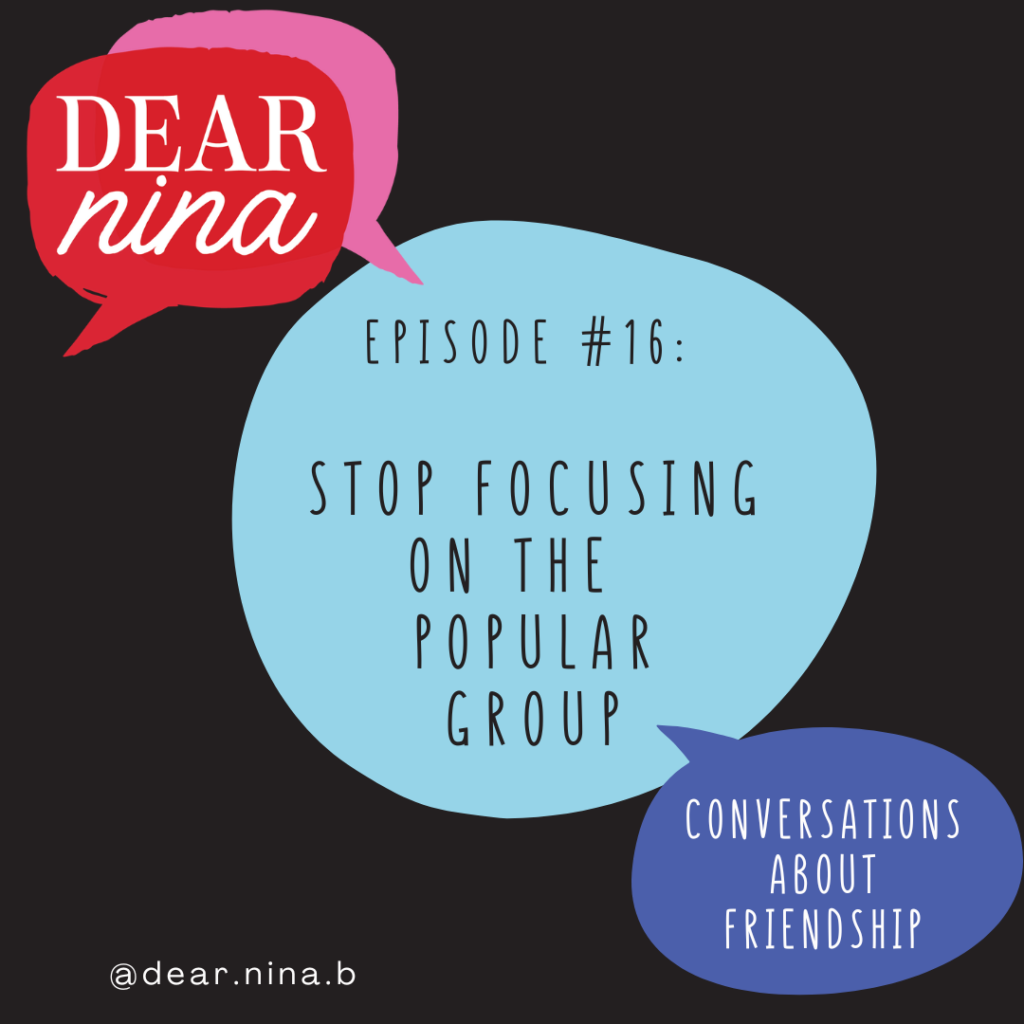The topic for episode 16 of Dear Nina: Conversations About Friends is about “in crowds” or “popular groups.”
Instead of having a guest today, I’m doing a solo show. It will be a little shorter so don’t worry, you won’t just hear me droning on for too long.
FIND EPISODE #16 ON APPLE PODCASTS, SPOTIFY, OR ANYWHERE YOU LIKE TO LISTEN TO PODCASTS! You can also listen below.
This whole idea of “the in crowd” or “the popular crowd” comes up in questions I’ve received for many years.
As a generality, I’m calling the issue in crowd vs out crowd, but let me clear, nobody uses that exactly language when they write to me.
What I get instead are letters explaining how frustrated people are when they aren’t being welcomed into a certain group, or when their kids aren’t included to hang out with a certain group. Or perhaps a kid has encountered a “mean girls” situation where they WERE friends with a certain group and are now being excluded. In these various questions I get, so much rides on a particular group of people. As if being being part of that one special group will be the key to all the friendship problems without recognizing that being included in such a group can create new problems, like not trusting that these are your real friends.
I find this worry comes especially from parents upset that their kids aren’t part of “that one group.”
An example— my best friend Taryn (who has been a guest on my show several times and who I’ve quoted in many of my answers in the column) and I once answered a question from a mom who was upset that her kid wasn’t being included in some of the neighborhood hangouts. The mom wanted to know if she should confront her own on and off friend whose kid is part of this group.
Taryn and I gave the advice that this mom should help her kid seek out different friends rather than trying to get her kid into this one group. We agreed that it was too bad her kid was being left out. But the truth is, you cannot force inclusivity. And you can’t force chemistry. And what if instead of focusing on how unfair or mean these kids were being, she accepted that this is probably not the right group for her kid. Even if she talked to the mom and the mom got the other parents to make sure her kid was included, how would that ever feel quite right to the kid? Something would always be a little off.
Good friendship feels reciprocal, mutual, and not forced. Sure, we can hope to teach these other kids a lesson on kindness, but it doesn’t actually translate to friendships that feel good and right. Taryn and I did get a comment from a reader who vehemently disagreed with us and felt we were letting this little neighborhood clique get away with something and encouraging the letter writer to be a doormat.
Obviously I disagree with the commenter, and that’s where this concept of in crowd out crowd comes into play. Why do we and our kids get so focused on one particular group. Who decided that this was the one and only group and that if this group doesn’t let you in, they’re horrible and there are no other great friendships to be had?
Trust me, I have been there myself at times growing up and as a parent dealing with my own kids being excluded or excluding others.
I have been frustrated to see my kids left out and had parents probably annoyed at me for not forcing more inclusivity at times. And I think all of that comes from this idea of “in crowds” and a sense of scarcity— like there are only certain people you can be friends with.
David Sedaris Says It Best!

When the essay begins, David is talking about how his husband, Hugo, looks at the stars each night and they start talking about whether there is life on other planets. David, in his typical way, wonders how meaningless being a celebrity on Earth would be if there were other beings on other planets because they wouldn’t know our celebrities and therefore it’s all pointless. Because if being a celebrity is about recognition, but there are people out there who don’t know who you are, then what IS celebrity in that case?
Sedaris brings this to the junior high level in the next few paragraphs, remembering a conversation among girls from a different school he overheard by the snack bar one summer in sixth grade. Sedaris writes:
” . . . According to the girl named Janet, neither Pam Dobbins nor J.J. Jackson had been invited to the Fourth of July party hosted by the Duffy twins, who later told Kath Matthews that both Pam and J.J. were out of the picture as far as the seventh grade was concerned. ;Totally, completely out,; Janet said. ;Poof.;
I didn’t know any Pam Dobbins or J.J. Jackson, but the reverential tone of Janet’s voice sent me into a state of mild shock. Call me naïve, but it had simply not occurred to me that other schools might have their own celebrity circles. At the age of twelve, I thought the group at E.C. Brooks was if not nationally known, then at least its own private phenomenon. Why else would our lives revolve around it so completely? I myself was not a member of my school’s popular crowd, but I recall thinking that, whoever they were, Janet’s popular crowd couldn’t compete with ours. But what if I was wrong? What if I’d wasted my entire life comparing myself with people who didn’t really matter? Try as I might, I still can’t wrap my brain around it.”
Note: bolding is mine, not from the printed version.
I have used that passage in my writing classes and people wrote heartbreaking memories of being excluded, social climbers, or of being at the top and always worrying about staying there. Those lines I bolded get me every time.
The thing is, adults often perpetuate these same ideas in adult social circles about the group they “must” be a part of to feel they matter or to feel accepted. When I hear kids refer to a certain crowd, basically saying those kids are “the popular group,” my answer is, “Says who?”
Truly, who gets to decide? It only feels real because we allow it to be real.
ASK AN ANONYMOUS QUESTION ANY TIME!
LEAVE ME A VOICEMAIL
SEE PAST EPISODES WITH SHOW NOTES.
JOIN THE DEAR NINA FACEBOOK GROUP!
FOLLOW ALONG ON INSTAGRAM.
Affiliate links to Amazon may earn me a few pennies.
Latest posts by Nina Badzin (see all)
- #149 – June Friendship Challenge: Ask a Friend For a Favor - June 1, 2025
- #148 – Tricky Friendship Etiquette for the Modern Age - May 26, 2025
- Dear Nina on NPR - May 24, 2025
- #147 – Share Good News With Your Friends - May 20, 2025


